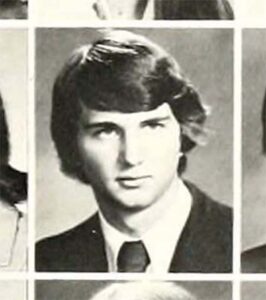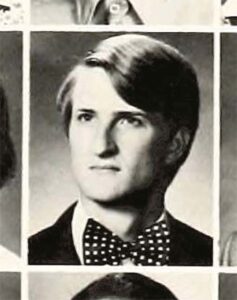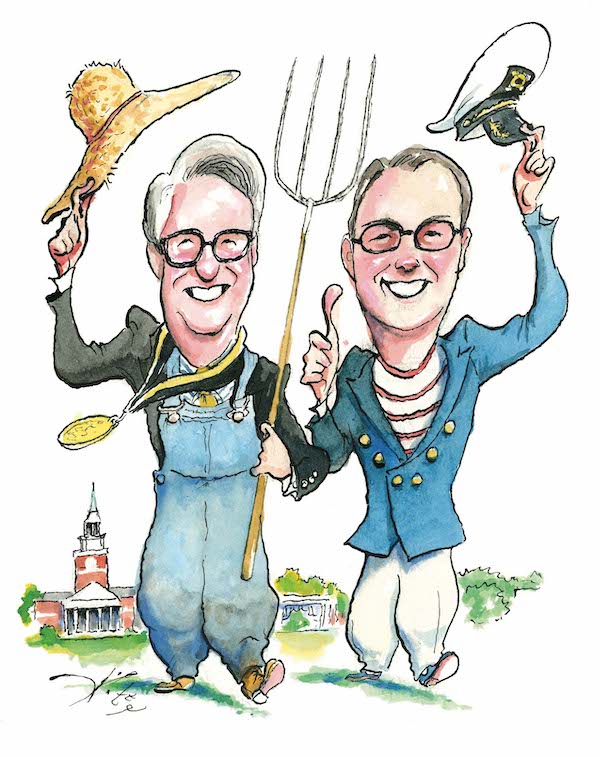
JUNE 30 marked a milestone when two prominent members of the administration who helped usher in major changes at the University retired.
Promoted to his most recent role in 2011, Reid Morgan (’75, JD ’79, P ’14, ’19) was senior vice president and general counsel. He served four presidential administrations, starting in 1979. His first job at the University was assisting the president, then working as a foundations officer and staff attorney. In 2000, he became general counsel, with responsibility for legal offices on the Reynolda Campus and at the medical school. In 2002, he became vice president and general counsel as well as secretary of the board of trustees and the University, assisting governing boards for the Reynolda Campus and Wake Forest University Health Sciences. (Though he retired in June, his role as secretary of the board of trustees will continue through June 2024.)
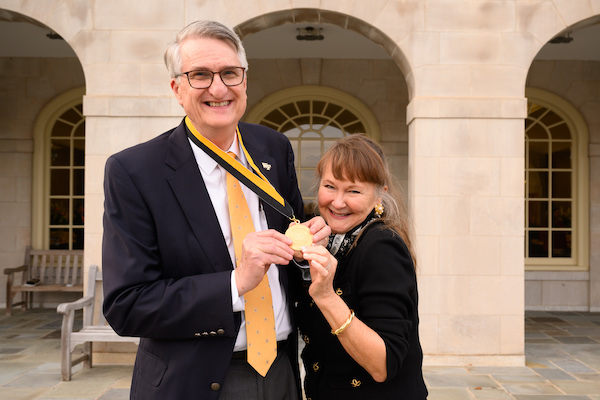
Reid Morgan (’75, JD ’79, P ’14, ’19) with his wife, Elizabeth (P ’14, ’19)
Morgan, a history major, gained renown for his detailed knowledge of Wake Forest’s history and its leaders. A constant steward of Wake Forest, he was the right person to coordinate the University’s 150th anniversary celebrations in 1983-84. In February he was awarded the Medallion of Merit, the University’s highest honor. President Susan R. Wente praised him for his “pivotal role” in the transformation of the University from a regional institution to one of the top nationally. She also lauded “his skill and success in building the substantial legal framework required to support and sustain the University’s ongoing growth,” his work to maintain the academic core of a multistate health system and his devotion to the University.

Wake Downtown
Throughout the years, Morgan has returned to the family farm where he grew up, in Union County, near Charlotte. He’s collected more than 15 tractors, and he works on the farm during his time off, earning him a nickname, “the gentleman farmer.”
In June, Hof Milam (’76, MBA ’91, P ’00, ’04) retired as executive vice president and chief financial officer. He was recruited back to Winston-Salem from Duke University, in part through the efforts of Morgan. “Like Willie Nelson, I’d always had Hof on my mind,” Morgan says.
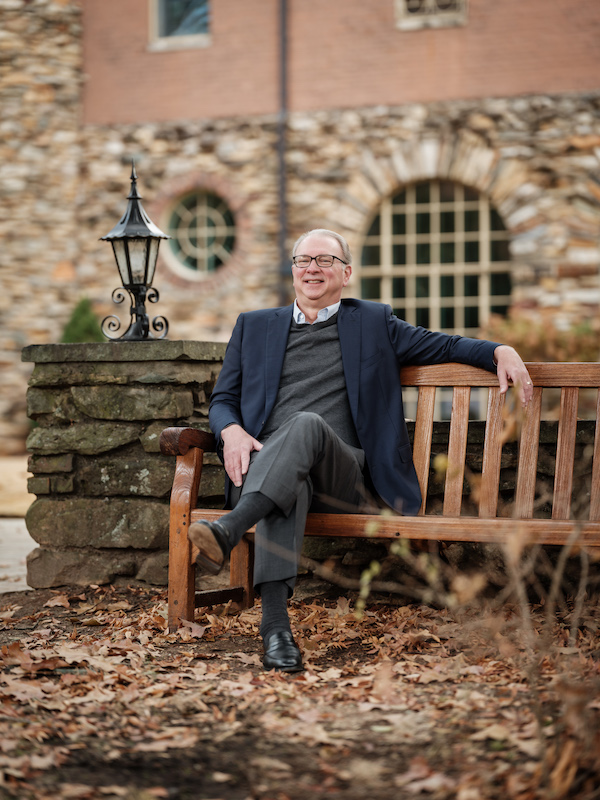
Hof Milam (’76, MBA ’91, P ’00, ’04)
The two men didn’t know each other when they were undergraduates but became friends when Milam worked in administration at Wake Forest’s medical school and at its affiliated health maintenance organization, QualChoice. Milam left to join Duke, where he was vice president of finance until joining the Cabinet of then-President Nathan O. Hatch (L.H.D. ’21) at Wake Forest in 2010.
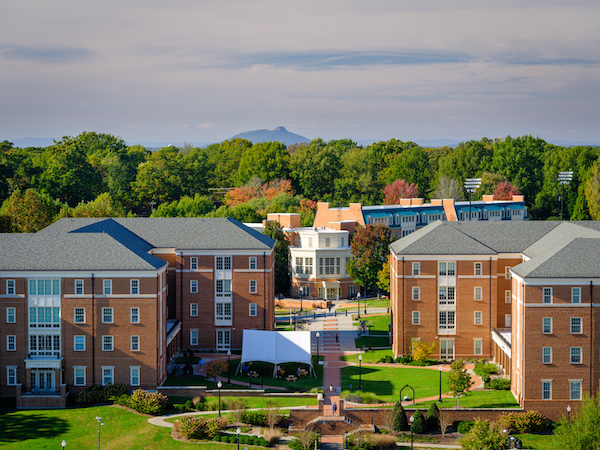
Dorms on North Campus
In his 12½ years in Reynolda Hall, with his office next door to Morgan’s, Milam oversaw vast operations, including finance; information systems; human resources; real estate; hospitality and auxiliary services; sustainability; and facilities and campus services. He helped determine financially viable ways to renovate dorms on the Quad and build new residence halls on the North and South campuses, as well as build Farrell Hall, the Wellbeing Center, athletics facilities and Wake Downtown, all, as one trustee said, “on time and within budget.”
The trustee, Bobby R. Burchfield (’76), in a retirement tribute to Milam at a trustees gathering, called it “the most significant period of growth and renewal of Wake Forest’s physical facilities since I arrived at Wake Forest as a student in 1972.” He said it was “nothing short of miraculous how Wake Forest managed its way through the (COVID-19) crisis,” and while he credited many for the response, “we cannot overstate the way Hof and his staff managed the financial affairs.”
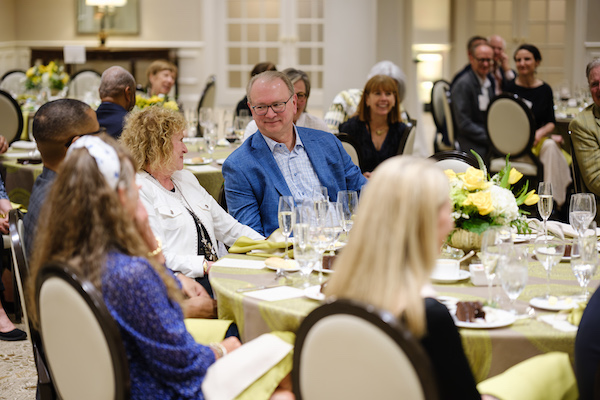
Milam and his wife, Kathryn (MALS ’95, P ’00, ’04), at Milam’s retirement dinner
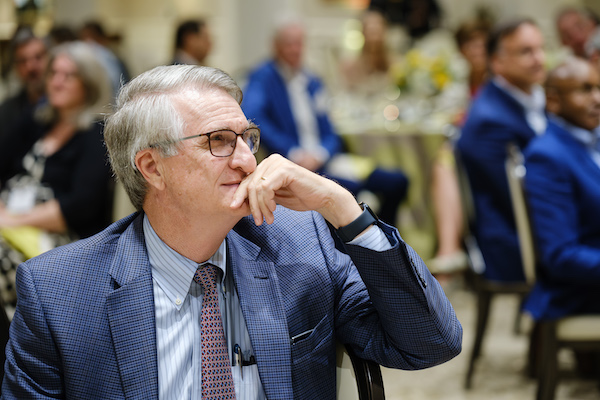
Morgan
Milam, who majored in what was then “accountancy,” is known for his precision. He likes to pay attention to “sight lines” and the way the campus appears to visitors. Thank him and his staff for restoring the road that presents a grand view of the arch on the Quad and for making sure students gained a clear view of Wait Chapel from new dorms on North Campus. His precision makes sense: He’s a woodworker with his tools placed just so on his garage wall. Milam has built a kayak and a 17-foot sailboat that awaits sanding after five years. “The building is the fun part. I don’t like the sanding,” he says.

Milam and his team shepherded new construction and renovation projects over Milam’s 12½ -year tenure.
He’s been a sailor for years but these days expects to spend a lot of time in the mountains, where he and his wife, Kathryn, have a vacation home. There, the grandchildren will continue to have the pleasure of walking “Cap’s Trail.”
Maria Henson (’82) of Wake Forest Magazine sat down with Morgan and Milam to talk about their memories and hopes. Their conversation has been edited for length and clarity.
Henson: Tell me about what attracted you to Wake Forest when you were young.
Milam: I had always followed Wake Forest sports because my dad (Bruce Milam, ’51, P ’76) was a Wake Forest grad. I had only been to Wake Forest once. My earliest encounter was 1967. When I was a seventh grader, my parents brought me to a Homecoming football game. That was the last season Wake Forest played in Bowman Gray Stadium. So, in addition to hanging out beside the AM radio and listening to basketball and football games during my childhood, there was that experience coming up here for a football game, which was pretty big for a guy from rural North Carolina. (He grew up in Sunbury, about 28 miles from Elizabeth City.)
Henson: How about you, Reid?
Morgan: I was a Baptist, but the main thing was my brother went to law school here and graduated the year I graduated from high school — ’71. It brought me up quite a bit to see him and back and forth to football games. It got me interested. He had a good experience, and I liked it. … I wouldn’t call it love at first sight, but it was definitely something I was drawn to, and so it worked out.
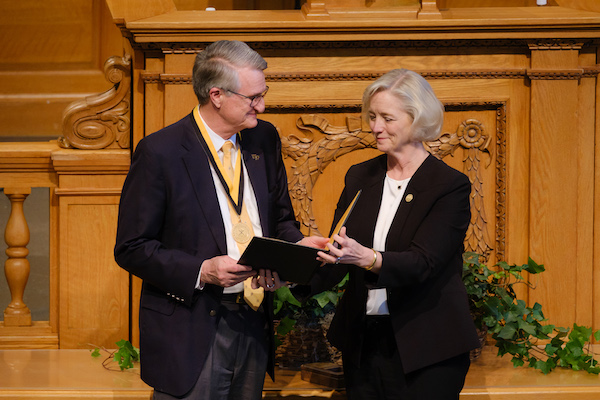
In February 2023, President Susan R. Wente presented Morgan with the Medallion of Merit, the University’s highest honor. <br />
Henson: Was it love at first sight for you, Hof?
Milam: No, I wouldn’t describe it that way. I don’t think that I fell in love so much with the campus as with the excitement of college. My senior year in high school I came up here for a football game and saw (the late trustee) Larry Hopkins (’72, MD ’77, P ’12) run for, I think, over 200 yards, and Wake Forest just killed this other team. There was just a lot of excitement. It was just this other attachment to Wake Forest largely through sports.
(Milam and Morgan then discuss that the opponent was Tulsa and recalled details about the statistics and star players.)
Henson: There are so many things that make it the Wake Forest experience you carry all of your life. What are some of the best memories you have?
Milam (laughing): Well, some of them I can’t talk about. What I carry from those days are relationships and friendships that formed, or in some cases friendships that have formed since then, like Reid or (trustee) Burchfield that I didn’t really know that well. My freshman year was really taking advantage of freedom, which was a problem. My grades reflected that. I did crazy stuff. Like when Wake Forest upset Carolina in the ACC Tournament, which was a big deal back then. We were in last place, I believe. That night a group of us drove to Carolina to rub it in.
If I’ve got the right time, after that game there was a big celebration on
the Quad, and the place got pretty muddy with people mud sliding and rolling the Quad.
Morgan: I was out there. It was the ACC Tournament of ’73, right? Remember that? Lee Foye (’76) hit the shot that tied the game, and Phil Perry (’75) hit the shot that won the game. Everybody just merged onto the Quad from the dorms. There was nothing else to do. (Laughing) People started running and sliding.
Milam: I shouldn’t just dwell on sports, but when you start thinking about all those ACC games, it seemed like such a big deal then. Everybody went to the basketball games, and most everyone went to the football games.
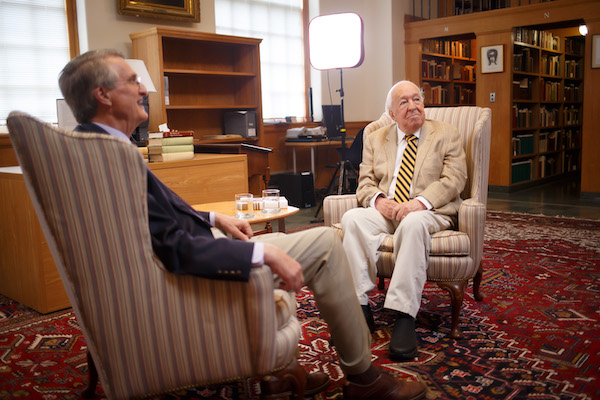
Morgan with his longtime friend Provost Emeritus Edwin G. Wilson (’43, P ’91, ’93)
Henson: What are your best memories, Reid?
Morgan: Like Hof I had great friends — in the suite and some outside the suite. We went to most meals together. In some ways, it was not a large world but a really good world, you know? I certainly enjoyed the classes and all. … I got to know the professors. It’s not like I went to see them every day, but I got to know them.
Sports were big. It was THE thing to do. And you went. And you stayed. Whether the team was winning or losing big, either way.
When I was a sophomore, I found out from a friend about an opportunity to go to the games and be part of the stats crew and the group that helped put on the games from the standpoint of press support. I did that junior and senior year, some all the way through law school. Football and basketball. So, every home game and the ACC Tournament and the NCAA Tournament in Greensboro in ’74 when NC State won with David Thompson. … We had a great time. We went over and did the tournament.
In those days, stories were not submitted electronically at all. They did it with typewriters and telecopiers. Our job at the end of the game was to go get the paper from the sports writers and take it to the telecopy machine and send it one page at a time. I got to know a lot of sportswriters that way.
- Milam
- Morgan
Henson: Reid, what would you say is Hof Milam’s legacy after all these years of service to Wake Forest?
Morgan: There are so many things I could say. The first part would be accomplishing the objectives of his administrative responsibilities at Wake Forest in terms of really organizing the finances and the resources of Wake Forest and accounting for them in a way that made us so much more able to use our resources well, to understand our capability well of meeting needs in any moment. Then also applying that. And also coming forward in meeting challenges like renovating the original dorms and finding ways to do the Wellbeing Center. The system and the facilities as well as Graylyn, so all that in terms of really making it happen for Wake Forest in his job.
Second, is how he did it, which was an essential part of, I think, why he came here. And the way in which he lived out what Wake Forest is in his leadership and with his people who worked in his team. … Hof’s way of handling his large administrative footprint here made it possible for Wake Forest to be what it is in terms of its personality and its way of doing things.

During his time on the Cabinet, Milam oversaw the completion of the Wellbeing Center, urged that there be a “sight line” to Wait Chapel from new North Campus dorms and backed building a road for a better entrance.
Henson: You get to return the favor. What do you think is Reid Morgan’s legacy?
Milam: This is tough because Reid is much better at words than I am. Listening to him, I think about the “what” and the “how” things are done. Reid has always delivered and works tirelessly on behalf of the University. But it’s also how he goes about doing it. I hope that Wake Forest doesn’t lose sight of the importance of the “how” to do things. That gets back to all of the relationships. Reid has done an incredible job of looking out for the best interest of Wake Forest in some really complicated deals … (such as) the complicated business transactions related to the medical center.
I don’t know of anybody who can cover the breadth of expertise, projects, etcetera, that Reid has covered. What I’m in awe of is his intelligence, his dedication, how he works tirelessly for Wake Forest and his insightfulness. It’s been a joy to work with him. He lets me be as blunt as I want to be about stuff. We’ve had a good partnership for over 12½ years and even prior to that, frankly.
Morgan: It changed my life when Hof came to Wake Forest. It changed it because Hof created such a sense of partnership inside the administration. The way in which Hof set the tone in doing the right thing for Wake Forest was something there was no question in the room about. The only standard that really mattered was doing the right thing for Wake Forest in decision making. And strong.
Milam: Which is what you’ve always done.
Morgan: I’ve tried to follow that. To have the person in charge of resources have that idea — it’s a key.
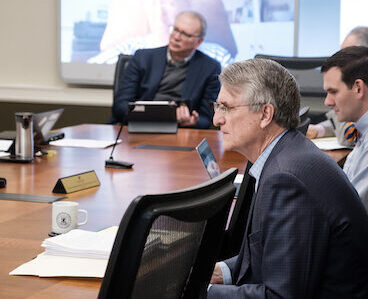
Milam and Morgan served with senior administrators and health officials on a COVID-19 task force. They gathered in Reynolda Hall on March 16, 2020, in person; afterward, they moved their constant meetings online during the worst of the crisis.
Henson: (Acknowledging Morgan’s reputation as a tireless worker), I heard a surprising story about you as the gentleman farmer having had an unpleasant encounter and still showing up for work at Wake Forest. What happened?
Morgan: I was out there mowing a waterway with a Bush Hog-type rotary cutter. An open-tractor platform. No cab. And, bumblebees, you know, nest in the ground, and you can really stir them up by mowing over them. The first thing they do (that day) is attack the muffler. That’s the heat source and the noise. Oh, but that’s limited gratification! So, they turned their attention to something else, and they found me. …
I switched off the motor. I jumped off and ran to get away. It was a little bit of rough ground. I stumbled, you know, and just got stung the whole time. I finally got away from them 150 feet away. I got back and started looking at the (stung) places, and I noticed two little places down on my ankle. … The next morning, I noticed my ankle really looked different.
About 30 hours later I was passing Baptist (hospital) on my way home, and I thought, “Well, I’ll stop and see what it is.” They had some kind of a toxicologist in the emergency room at that time. And they said, “Yep, it’s a copperhead bite.” …
I didn’t really get much venom. I got back here (to Reynolda Hall) and told a story about that. Nathan (Hatch) was somewhere between amazed and shocked about the story. And his reaction was, “If it were mine, I’d have that farm on the market before tomorrow morning!”
Henson: How did that incident rank in the complexities or pain of your regular job?
Morgan (laughing): It hurt, but it wasn’t like some major-league thing where you get all kinds of trouble with it.
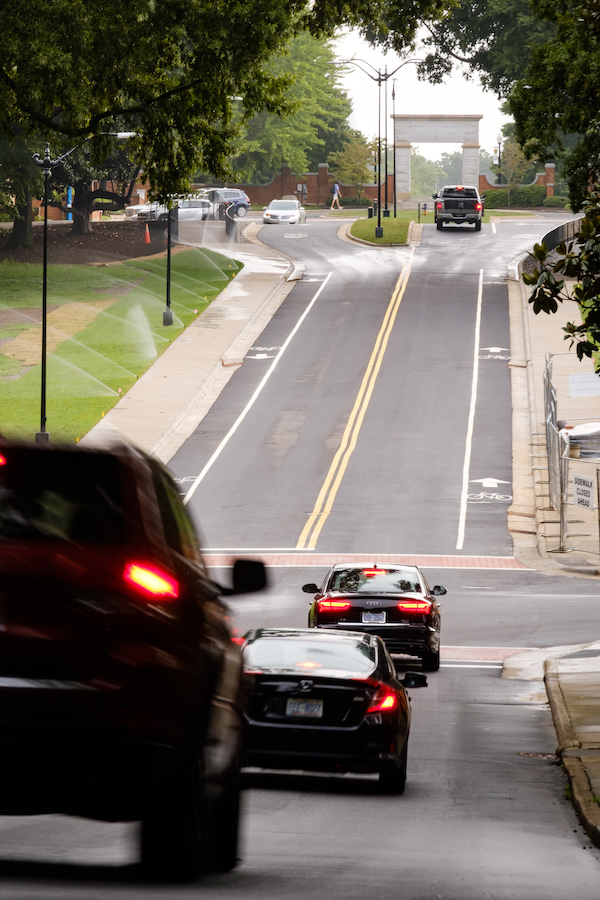
Henson: As we wrap up today, you have a chance to tell alumni what you wish they knew about the inner workings of the institution that they didn’t see as students, and please share your hopes for the future.
Milam: I don’t think alumni always appreciate the complexity of the University. That’s one of the things I tried to do to help alumni understand that (with) this budget model, where, if somebody wants more financial aid and somebody wants smaller class sizes, what would be the tradeoffs? They’re complex.
Morgan: I think alumni know that while it’s a lot about feeling and memory, it’s also about living out the values in a complex world. So, I feel like they know that already, but I guess I would want them to know that the things that they feel most deeply about about Wake Forest that the administration and the faculty — and I would like to think the students, too — are all aware of … and that the Pro Humanitate aspect of who we are is alive in what we do. The process of making good things happen involves many twists and turns, but the institution is committed to doing that. Like Hof’s answer, I’d like for them to have confidence that that’s what the place is still about, even in a world that challenges getting all those things done.
Milam: What I hope for Wake Forest —it gets back to how things are done, not just what is done. The “what” is important, but I don’t want people to lose sight of the “how.” When I look back on my time at Wake Forest, I think less about accomplishments and more about relationships. Wake has that value being placed on relationships. There’s been some criticism recently about Wake being too relational, and I can understand where that comes from. But Wake Forest still has to be a place where people work here not just because of the job and what they’re paid, but how they feel about the place, the attachment to the place. That’s going to be challenging especially with newer generations coming on. (Last spring, he talked with people all over campus and was amazed by the number who have been working here for more than 12½ years, he says.)
Morgan: You certainly want Wake Forest to be of greater service to humanity and education and all the things that will make that true in terms of scope and scale and numbers. I certainly hope all those things for Wake Forest as it continues to find its place in terms of the scope of its program and enrollments. The thing that I would come back to is the motto — the ideal of Wake Forest — and what is the thing that we are really about as an institution.
I feel like Wake Forest has been living into that motto now for at least 189 years and finding exactly what it means to really be for humanity. The continued discovery of that, both with regard to breadth — what does that mean with respect to others? — and depth — what does that mean with respect to with others? — is something that I hope will continue unabated and that people will continue to hold that up as the most important thing about Wake Forest.
